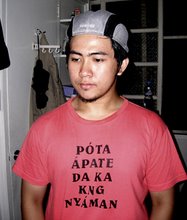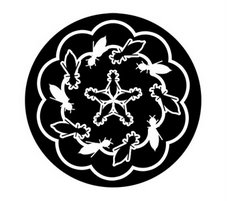By Robby Tantingco
Peanut Gallery
PEOPLE often describe Kapampangans as nothing but porma (form), i.e., shallow and without substance, obsessed with appearances and preoccupied with the pursuit of the good life. They tell us that Kapampangans look good, cook well, fight fearlessly, but we are not really that flattered, because we know these are not the virtues that matter and that make our race truly great and noble.
While reading Diego Bergaño's 1732 Kapampangan dictionary, I came across words that suggest Kapampangans originally were more profound than we think, and had more strength of character than we credit them for.
Succeeding generations probably lost this spiritual wealth due to interaction with colonizers, but today, after rediscovering these lost Kapampangan virtues in translated documents, we can honor the legacy of our ancestors by living their values once again.
For example, there is a term, lualo, which means "to go out in defense of the helpless, the destitute and the unprotected." It has no exact equivalent in other Philippine languages. When a word like this exists, it means its concept or practice was prevalent enough to necessitate its coinage.
The word sap or sapni, which means "camaraderie of partners, companions or friends," also applies to the camaraderie "even of a servant to a master." On the other hand, the word aniani, which means "reverence of a subject towards a superior," also means reverence "of the superior towards his subject."
These two words speak well of a people who not only treated their servants well but considered them friends and family, and returned the respect they got from them.
Saclong means to take the punishment meant for another or pay the debt which is not his own. A related word is dáme (diphthong damay), "to voluntarily take part in someone else's predicament or situation."
The English translation of Damayan da ca qng quecang lasa, which is "I condole with you in your suffering," is not an accurate translation because the Kapampangan dáme is more than offering words of condolences or expressing sympathy or same feeling, but actually participating in the other person's suffering, in order to ease his pain.
Thus, the word magdaráme, which refers to the Holy Week penitents, came from the root word dáme, because the penitents carry their cross or flagellate themselves in order to help ease Christ's suffering.
Today, penitents do it as reparation for sins, as gratitude for favors granted, as imitation of Christ, and as tourist attraction, but the original purpose of the magdaráme was "to take part in" (dáme) the passion of Christ, like a brotherhood--a mystical fellowship--of suffering.
There are flagellants all over the country and even in other countries, but only Kapampangan flagellants call themselves "fellow-sufferers." Even Bergaño himself wrote, "There is no adequate equivalent in Spanish to this word."
The early Kapampangans also valued age and respected their elders: macatua is "the elder, the venerable old man;" quetuan refers to "the attributes of an old man, excelling in age;" magmatua is "one who exercises the role of age, to whom everyone pays attention, and without whom nothing is decided."
Our ancestors valued their old folks as the wisest, most important members of the community. In contrast, we treat our old folks today as nothing more than babysitters, kitchen helps, and inconsequential members of the household, and not as the repository of family history and family values that they are.
Another extraordinary Kapampangan word: samal. This best applies to Mother Theresa of Calcutta because it means "the affection with which a charitable person cleans a nauseous person."
Our ancestors also understood the relationship between humility and forgiveness, as shown in the word sut, "to humble oneself; to reconcile oneself by going before the presence of the one to whom he humbles himself." For example, Isut mu cu cang ibpa cu, "Reconcile me with my father" or "Take me to the embrace of my father."
This Biblical imagery raises the following questions: Were these profoundly Christian concepts and virtues already inherent in pre-colonial Kapampangans even prior to their conversion to Christianity?
Or had Christian values permeated Kapampangan vocabulary by the time Bergaño wrote his book in 1732? Or did Bergaño merely gave a Christian spin or flavor to basically pagan concepts and indigenous terms?
Maybe all of the above. But the more important question is, How can modern-day Kapampangans revive these lost Kapampangan virtues?
Kapampangans should be known not just for their porma and culinary skill, but also for their aniani, their samal, their dáme and their saclong. While a cultural revival continues to sweep the province, a parallel spiritual and moral regeneration should also occur, especially in the dawning of a new era brought about by Fr. Ed Panlilio's spectacular victory.
Reference: Vocabulario de Pampango, by Diego Bergaño, OSA (1732), translated by Fr. Venancio Samson and published by the Holy Angel University Center for Kapampangan Studies. Book launching on August 24, 2007. For reservation of copies, call (045) 888 8691 local 1311, 1312 or email rptmt@yahoo.com .
Alben meng manyaman, boy!
July 3, 2007
Subscribe to:
Post Comments (Atom)








5 comments:
sir tantingco ng hau?
yung kamaru ba na ito konektado ba sa kamaru ng hau?
uhm, ikaw ba yung nag 1st place sa rspc 2002?
^ yes, HAU is stated below.
This KAMARU is not realted to HAU's archaeology org.
RSPC 2002... hmm. Let me see. I was in Fourth Year High then and I competed in Feature Writing in English. Won first place both in Division and Regional (about terrorism), so I guess that's me. :)
"Or did Bergaño merely gave a Christian spin or flavor to basically pagan concepts and indigenous terms?"
did = present
gave = past
so i think it should be "did Berganno merely give..." i may be wrong though.
balu ku ali naman ini ing tutung pisasabyan. OC ku mu. hehehe.. cheers to a fellow caballero! :) mayap ka pa, dakal ka balu kultura tamu. ika pa yata maging mentor ku. heehee... sana manikwa kung kopya ning libru. price?
^ typographical error ing aus keta, atse! hehe.
dakal ka rin abalu dikil king panga-Kapampangan, basta makabuklat ka kaladua! hahaha. :)
maus ka karetang makasulat a numero kayi kutang mu nung magkanu la.
ah oo. ikaw nga yun. it's good to see someone you've just talked to for 5 minutes preserving the same culture that you're also trying to save. :)
Post a Comment